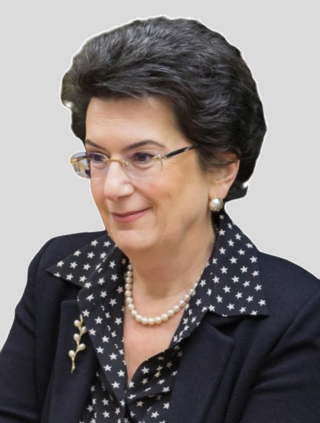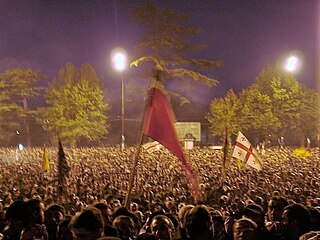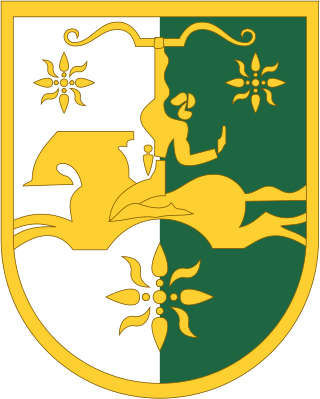
Politics in Georgia involve a parliamentary representative democratic republic with a multi-party system. The President of Georgia is the ceremonial head of state and the Prime Minister of Georgia is the head of government. The Prime Minister and the Government wield executive power. Legislative power is vested in both the Government and the unicameral Parliament of Georgia.

Mikheil Saakashvili is a Georgian and Ukrainian politician and jurist. He was the third president of Georgia for two consecutive terms from 25 January 2004 to 17 November 2013. From May 2015 until November 2016, Saakashvili was the governor of Ukraine's Odesa Oblast. He is the founder and former chairman of the United National Movement party. Saakashvili heads the executive committee of Ukraine's National Reform Council since 7 May 2020. He is currently serving a prison sentence in Georgia for abuse of power and organization of a grievous bodily injury of an opposition MP.

Nino Burjanadze is a Georgian politician and lawyer who served as Chairperson of the Parliament of Georgia from November 2001 to June 2008. As the first woman she has served as the acting head of state of Georgia twice; the first time from 23 November 2003 to 25 January 2004 in the wake of Eduard Shevardnadze's resignation during the Rose Revolution, and again from 25 November 2007 to 20 January 2008, when Mikheil Saakashvili stepped down to rerun in the early presidential elections. She withdrew into opposition to Saakashvili as the leader of the Democratic Movement-United Georgia party in 2008. In October 2013, she ran in the presidential election, competing against 22 candidates. She ended third with 10 percent of the vote.

Zurab Zhvania was a Georgian politician, who served as Prime Minister of Georgia and Speaker of the Parliament of Georgia.

United National Movement is a liberal and pro-western political party in Georgia founded by Mikheil Saakashvili which rose to power following the Rose Revolution. Since the 2012 parliamentary election, it is the main opposition party.

The Rose Revolution or Revolution of Roses was a nonviolent change of power that occurred in Georgia in November 2003. The event was brought about by widespread protests over the disputed parliamentary elections and culminated in the resignation of President Eduard Shevardnadze, which marked the end of the Soviet era leadership in the country. The revolution derives its name from the climactic moment, when demonstrators led by Mikheil Saakashvili stormed the Parliament session with red roses in hand.

Politics in Abkhazia is dominated by its conflict with Georgia. Abkhazia became de facto independent from Georgia after the 1992–1993 war, but its de jure independence has only been recognised by a few other countries. Abkhazia is a presidential representative democratic republic with a multi-party system, wherein the President is both head of state and head of government. Executive power is exercised by the government of the Republic of Abkhazia. Legislative power is vested in both the government and the People's Assembly of Abkhazia.

Irakli Alasania is a Georgian politician, soldier and former diplomat who served as the Minister of Defense of Georgia from 2012 to 2014. He was Georgia's Ambassador to the United Nations from September 11, 2006, until December 4, 2008. His previous assignments include Chairman of the Government of Abkhazia(-in-exile) and the President of Georgia's aide in the Georgian-Abkhaz talks. Soon after his resignation, Alasania withdrew into opposition to the Mikheil Saakashvili administration, setting up the Our Georgia – Free Democrats party in July 2009. In 2012 Alasania was appointed Minister of Defense, a position he held until 2014.

The Adjara crisis, also known as the Adjarian revolution or the Second Rose Revolution, was a political crisis in Georgia's Adjaran Autonomous Republic, then led by Aslan Abashidze, who refused to obey the central authorities after President Eduard Shevardnadze's ouster during the Rose Revolution of November 2003. The crisis threatened to develop into military confrontation as both sides mobilized their forces at the internal border. However, Georgia's post-revolutionary government of President Mikheil Saakashvili managed to avoid bloodshed and with the help of Adjaran opposition reasserted its supremacy. Abashidze left the region in exile in May 2004 and was succeeded by Levan Varshalomidze.

In 2007, a series of anti-government protests took place across Georgia. The demonstrations peaked on 2 November 2007, when 40,000–50,000 rallied in downtown Tbilisi, the capital of Georgia. People protested against the allegedly corrupt government of president Mikheil Saakashvili. Protests triggered by detention of Georgian politician Irakli Okruashvili on charges of extortion, money laundering, and abuse of office during his tenure as defense minister of the country were organized by the National Council, an ad hoc coalition of ten opposition parties, and financed by the media tycoon Badri Patarkatsishvili. Demonstrations occurred both in September and November 2007 and were initially largely peaceful. The protests went downhill by 6 November 2007, but turned violent the next day when the police, using heavy-handed tactics, including tear gas and water cannon, unblocked Rustaveli Avenue, Tbilisi's main boulevard, dislodged the protesters from the territory adjoining to the House of Parliament, and prevented the demonstrators from resuming the protests. The government accused the Russian secret services of being involved in an attempted coup d'état and declared a nationwide state of emergency later that day which lasted until 16 November 2007.

Parliamentary elections were held in Georgia on May 21, 2008. President Mikheil Saakashvili proposed a referendum on bringing them forward from October to April after the 2007 Georgian demonstrations. The referendum was held at the same time as the early presidential election on 5 January 2008; according to exit polls, voters were largely in favour of having the elections in spring.

Presidential elections were held in Georgia on 5 January 2008, moved forward from autumn 2008 by President Mikheil Saakashvili after the 2007 demonstrations.

Levan Gachechiladze is a Georgian politician and businessman who ran as the main opposition candidate in the 5 January 2008 Georgian presidential election.

Salome Zourabichvili is a Franco-Georgian politician and former diplomat who currently serves as the fifth President of Georgia, in office since December 2018. She is the first woman to be elected as Georgia's president, a position she will occupy for a term of six years. As a result of constitutional changes coming into effect in 2024, Zourabichvili is expected to be Georgia's last popularly elected president; all future heads of state are to be elected indirectly by a parliamentary college of electors.

Bidzina Ivanishvili is a Georgian politician and billionaire businessman, who served as Prime Minister of Georgia from October 2012 to November 2013.

In 2009, a mass rally by a coalition of opposition parties in took place in Georgia against the government of President Mikheil Saakashvili. Thousands of people demonstrated, mainly in the capital, Tbilisi, starting on 9 April 2009, demanding Saakashvili's resignation. On the first day of demonstrations, up to 40,000 people gathered in Tbilisi. Protests continued for over three months, although fewer people participated as time passed than during the first days. On 26 May 2009, the Georgian Independence Day, 60,000 protesters took part. Although peaceful at first, there were incidents of fighting between the Georgian police and protesters. The daily rallies gradually dwindled and ended, without achieving any tangible results, on 24 July –107 days after they kicked off.

Parliamentary elections were held in Georgia on 1 October 2012. The opposition Georgian Dream coalition of billionaire businessman Bidzina Ivanishvili won a majority of the seats. President Mikheil Saakashvili conceded his party's defeat.
In 2013, Georgia finalized its first-ever peaceful change of power and transition to a parliamentary republic. The Georgian Dream-dominated government, which came to power after defeating, in October 2012, the United National Movement led by the outgoing President Mikheil Saakashvili, promised more democratic reforms. The Georgian Dream candidate Giorgi Margvelashvili won the presidential election in October 2013 and the new constitution significantly reducing the authority of the president in favor of those of the prime minister and government came into effect. In November, the leader of the Georgian Dream, Prime Minister Bidzina Ivanishvili announced his withdrawal from politics as promised earlier, and the Parliament of Georgia approved his nominee, Irakli Garibashvili, as the country's new head of government.

Giorgi Margvelashvili is a Georgian academic and politician who was the fourth President of Georgia, in office from 17 November 2013 to 16 December 2018.

Strength Is in Unity or United National Movement – United Opposition "Strength Is in Unity" is a political coalition in Georgia established before the 2018 presidential election and centered around the United National Movement. Originally set up to support the candidacy of presidential nominee Grigol Vashadze, it brought together ten political parties opposed to the ruling Georgian Dream party. It continued to operate after 2018, supporting local candidates and eventually fielding a joint electoral bloc during the 2020 parliamentary election.



















